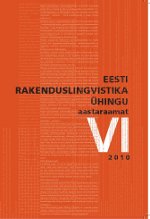Language & authoritarianism in the 20th century: the cases of Estonia and Catalonia
Language & authoritarianism in the 20th century: the cases of Estonia and Catalonia
Author(s): Delaney Michael SkerretSubject(s): Language and Literature Studies
Published by: Eesti Rakenduslingvistika Ühing (ERÜ)
Keywords: diglossia; languages in contact; language policy; language planning; endangered languages; Estonian; Russian; Catalan; Castilian Spanish; Spanish
Summary/Abstract: The 20th century saw the Soviet and Francoist regimes enforce their respective ideologies in Estonia and the Catalan-speaking territories in Spain. In both cases, the autochthonous language suffered under the stringent control of the mechanisms of censorship and repression. In fact, Soviet and Spanish leaders—representing both extremes of the political spectrum—tried to replace the use of the autochthonous language in many sociolinguistic domains with their own—Russian and (Castilian) Spanish—as these languages embodied the ideologies and the new orders that they wished to establish. This paper compares and contrasts the diverse methods of control over language carried out in Estonia and the Catalan-speaking areas of Spain in order to demonstrate that highly centralised multilingual states—whatever their political ideology—can make use of surprisingly similar means of control, ultimately depriving local linguistic communities of the ability to use and develop their own language.
Journal: Eesti Rakenduslingvistika Ühingu aastaraamat
- Issue Year: 2010
- Issue No: 6
- Page Range: 261-276
- Page Count: 15
- Language: English

